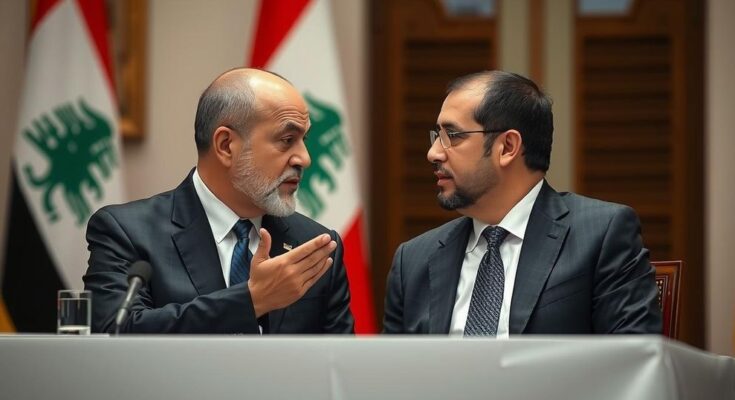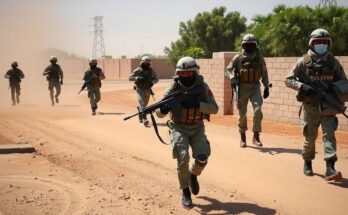Lebanese Prime Minister Najib Mikati visited Syria for the first time to meet with new Syrian leader Ahmad al-Shara, following recent border clashes that injured Lebanese soldiers. This meeting is significant amid Lebanon’s recent presidential election and Syria’s ongoing civil unrest, as both nations seek to manage internal and external pressures affecting their stability and security.
On Saturday, Lebanese Prime Minister Najib Mikati embarked on an official visit to Damascus, marking his first meeting with Syria’s new government. This visit comes in the wake of heightened tensions along the shared border, where clashes last week resulted in injuries to at least five Lebanese soldiers. The discussions were held with Ahmad al-Shara, the leader of Hayat Tahrir al-Sham, who recently assumed control following the ousting of former President Bashar al-Assad last month.
Prime Minister Mikati’s visit also coincides with political changes in Lebanon, notably the recent election of Joseph Aoun as the Lebanese president, filling a vacancy that had persisted for two years. President Aoun is set to engage in consultations for appointing a new prime minister shortly. In Syria, Mr. al-Shara is faced with the formidable task of restoring stability in a nation fractured by over a decade of civil unrest, characterized by the rise of numerous armed factions.
Lebanon has expressed concerns regarding the spillover of Syria’s instability into its borders, particularly following the recent border incident involving Syrian militants. The Lebanese military had been attempting to dismantle an illegal crossing in the region when the clashes occurred.
This meeting signals an important step in diplomatic relations between the two nations amid ongoing security challenges, as both countries navigate the complexities of their intertwined histories and current geopolitical realities.
The relationship between Lebanon and Syria has historically been complex, characterized by political, social, and economic overlaps. The regional instability, particularly due to the Syrian civil war that has lasted for over 14 years, has compounded their interconnected challenges. The recent ascension of a new government in Syria and the election of a president in Lebanon provide a backdrop for potential diplomatic engagement. Both nations are wary of the escalation of civil strife impacting their borders, making discussions regarding security and governance critical at this juncture.
In summary, Prime Minister Najib Mikati’s visit to Syria emphasizes the significance of dialogue between Lebanon and Syria, especially in light of recent border incidents that underscore ongoing tensions. The changing political landscapes in both nations present a unique opportunity for collaboration aimed at mitigating shared challenges. It also reflects the broader implications of regional stability and the need for effective governance in the wake of prolonged conflict in Syria.
Original Source: www.nytimes.com




